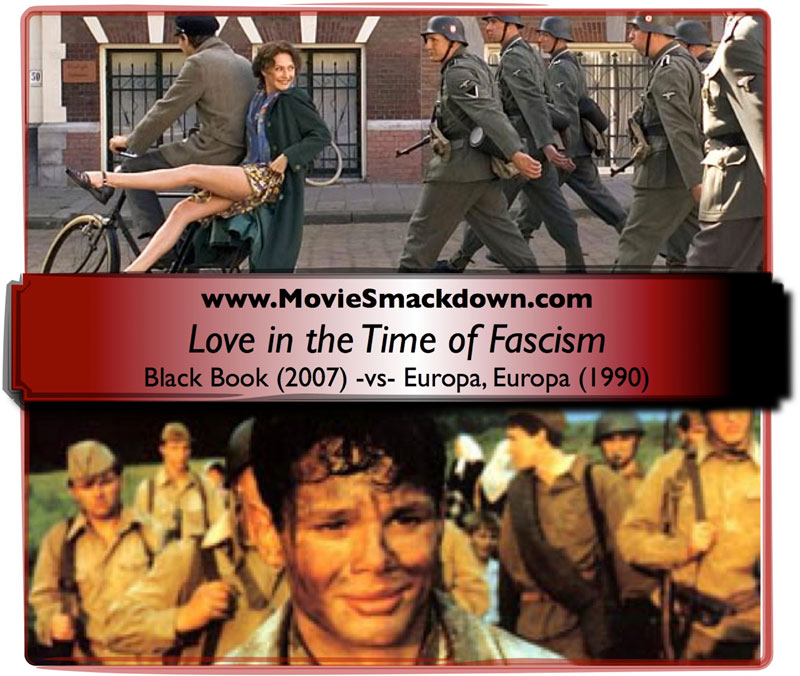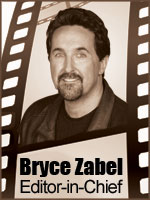
 The Smackdown
The Smackdown
It’s the ultimate identity crisis. You have to pretend to be a part of a group that wants to kill everybody in the group you’re really in.
That’s the jeopardy that these films (both supposedly based on true stories) place their lead characters in. Both Black Book and Europa, Europa put Jewish characters in the agonizing peril of having to pass as Nazis in order to stay alive during World War II.
Each of our films wants to raise the question about what’s acceptable behavior in order to survive and what a person is willing to risk in order to strike back at a hated enemy. If you start to act like them, do you run the risk of becoming the thing you hate the most?
[singlepic id=118 w=320 h=240 float=right]
The Challenger
Director Paul Verhoeven went back to his roots with this World War II film set in occupied Holland. He started there a quarter of a century ago with Soldier of Orange but took a long strange detour with films like Total Recall, Basic Instinct and, yes, Showgirls. He’s got plenty of sex and violence in this tale about Rachel Stein, a young Jewish woman who survives the holocaust by adapting whenever and however necessary. She’s played by the phenomenal Dutch actress Carice van Houten. After losing her family from a betrayal that leads to their death by machine gun fire, she joins the Resistance and finds her most important work to be the seduction of the head of the Gestapo in The Hauge, a sensitive Nazi-type named Ludwig Mantze. He’s played by my favorite German actor, Sebastian Koch, who stole the show in the previous year’s The Lives of Others.
[singlepic id=77 w=320 h=240 float=right]
The Defending Champion
Europa, Europa (or Oy-rope-uh, Oy-rope-uh, if you want to pronounce it with a German accent) is set between 1938 and 1945, and is based on the true-life story of Solomon Perel, the son of a Polish shopkeeper in Germany. In the film, the character Solly (played by Marco Hofschneider) loses his family, too, and ends up in a series of life incidents that have a Barry Lyndon-esque feel to them. First he ends up in a Russian orphanage, then fighting for a company of soldiers, then ends up in a Hitler-Youth camp. The entire time (and this is not played to be funny) he has to worry about being exposed by his penis, which is circumsized, because if anybody see it, they will know him for the imposter he is. Honestly, this is a film problem for a main character you are not apt to see repeated soon. Director Agnieszka Holland does a beautiful job,many of her outdoor scenes are painterly, but the style does not really accent the tension of Solly’s predicament as much as it could.
The Scorecard
A lot depends on what you’re looking for in a World War II film. Black Book has all the conventions of a classic suspense-thriller: building tension, shocking reversals, lots of nudity and a strong story arc. It is clearly more commercial than Europa, Europa which is likely to appeal to your intellect as an art-house film. Something else in the earlier film’s favor is that it pretty damn fascinating to see a Jew in a Hitler-Youth camp while we’ve definitely seen plucky Black Book like resistance fighters passing as Germans in heavily armed headquarters before.
Both films do have an old-time movie serial feel to them, feeling more episodic than the typical U.S. film. Black Book, however, is cranked up in volume far beyond Europa, Europa.
That’s not always good. I found the staging of several of the gunfights to be almost comically rendered. Almost like watching an episode of the old TV Combat series than Saving Private Ryan. Very unrealistic. In contrast, because Europa, Europa is so out of your ordinary world-view, that films’ quirkiness makes it seem more accurately rendered because, well, who really knows what a locker room penile gazing among Nazis suspense scene should look like?
The Decision
At the risk of sounding like a low-brow, Black Book still just works, no matter how tone-deaf a few moments come across as. Overall, it is compelling enough that the sub-titles make almost zero impact on the film’s enjoyment. The very American-ness that Verhoeven strives for in his directing makes the viewing experience comfortable and the language made it feel just a shade more realistic.
Europa, Europa is more like what iTunes would call a Deep Cut. Start with our winner Black Book, then see if you want to go deeper.

I just watched Black Book yesterday and I loved it! Despite I chose a version that wasn’t subtitled so I had tough times during “German scenes” xD
lol
Sounds like a very authentic experience!